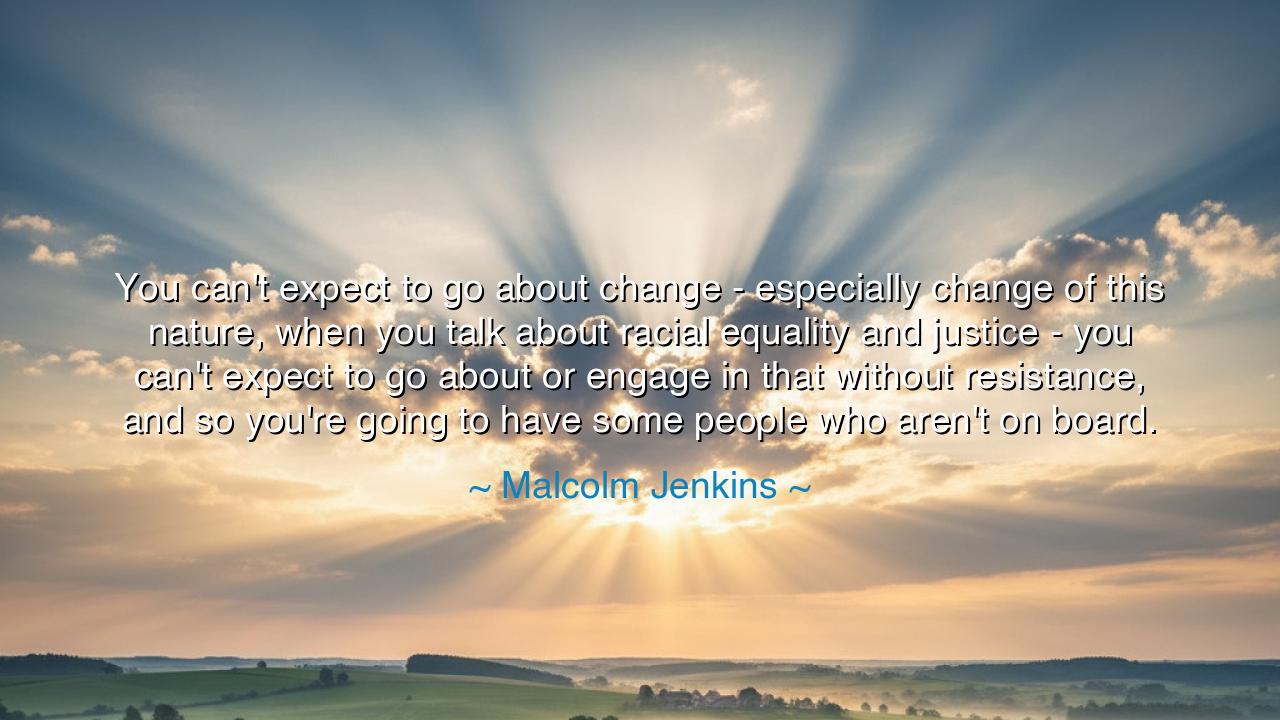
You can't expect to go about change - especially change of this
You can't expect to go about change - especially change of this nature, when you talk about racial equality and justice - you can't expect to go about or engage in that without resistance, and so you're going to have some people who aren't on board.






"You can't expect to go about change - especially change of this nature, when you talk about racial equality and justice - you can't expect to go about or engage in that without resistance, and so you're going to have some people who aren't on board." These powerful words from Malcolm Jenkins speak to the nature of true change—a force that disrupts the established order, challenges long-held beliefs, and brings to the surface deep-seated fears and prejudices. Jenkins acknowledges the inevitable resistance that accompanies the fight for racial equality and justice, reminding us that the journey toward change is never without struggle, and that some will always oppose progress. This truth, though painful, is one that has echoed throughout history and across generations of those who have fought for justice.
In the ancient world, there were those who stood for justice and equality, even in the face of great opposition. Socrates, the philosopher of Athens, challenged the status quo by questioning the morality of the government and the justice of the laws that oppressed the common people. He, too, faced resistance, as his ideas threatened the power structures that had held sway for centuries. In his trial, Socrates famously declared, "The unexamined life is not worth living," a testament to his unwavering belief in the pursuit of truth and justice, no matter the cost. His refusal to abandon his principles, despite the personal consequences, serves as an example of the resistance one must face when challenging the established order. Jenkins’ words, in this light, are a modern echo of the ancient struggle for equality.
This concept of resistance to change is not new; it is woven into the very fabric of the human experience. Consider the example of Harriet Tubman, who, despite the fierce opposition and dangers she faced, risked her life again and again to free enslaved people on the Underground Railroad. Tubman’s work was not without resistance—from those who sought to maintain the institution of slavery, from those who feared change, and even from some within her own community who had grown complacent. Yet, Tubman understood that true freedom required perseverance in the face of adversity, and she continued her work with relentless courage. She is a prime example of how resistance to change is not an obstacle, but a signal that the fight is worth waging.
Jenkins’ reminder that we cannot expect change without resistance calls us to understand that the fight for racial equality and justice is not merely a social issue but a fundamental challenge to the very structures of society. It is not only about changing laws but about shifting hearts and minds, confronting deeply ingrained prejudices, and questioning systems that have been in place for generations. The Civil Rights Movement in the United States, led by figures like Martin Luther King Jr., was met with fierce resistance—violent opposition, discriminatory laws, and societal indifference. But King and the movement’s leaders understood that change was not easy, and it was through their courage and nonviolent resistance that they were able to force society to reckon with the moral imperative of racial equality.
In modern times, Jenkins himself has been a key figure in the ongoing fight for racial justice, using his platform as a professional athlete to speak out against police brutality, systemic racism, and inequality in the United States. His activism, particularly in the wake of the George Floyd tragedy, has been met with both support and resistance. Some have rallied around him, while others have condemned his actions as divisive. Jenkins understands that, just like the Civil Rights leaders before him, the struggle for racial equality is never smooth, and that resistance—whether in the form of criticism, hatred, or institutional opposition—is an inherent part of the process.
The lesson we must take from Malcolm Jenkins’ words is that resistance is not a reason to give up, but a sign that we are pushing for real change. Equality is not a gift that will be handed to us easily; it is something that must be fought for, consistently and relentlessly. The fight for justice will always face opposition from those who are comfortable in the old ways, but true change comes when we remain steadfast in our commitment to equality, no matter the resistance we face. As Jenkins and others have shown, the path to justice requires courage, persistence, and the unwavering belief that the fight is worth it.
In our own lives, we must recognize that the struggle for racial equality and justice is ongoing. When we face resistance—whether in our communities, workplaces, or even in our own hearts—we must press forward with the same resolve as those who have come before us. We must support the movements and leaders who challenge the systems of oppression, and we must be willing to stand up and speak out, even when it is difficult or unpopular. Let us take the example of Socrates, Tubman, and Jenkins, and face the resistance with the knowledge that the fight for justice is not just a battle for today, but a legacy for future generations. Through steadfastness and unity, we will build a world where racial equality is not just an ideal, but a reality for all.






AAdministratorAdministrator
Welcome, honored guests. Please leave a comment, we will respond soon